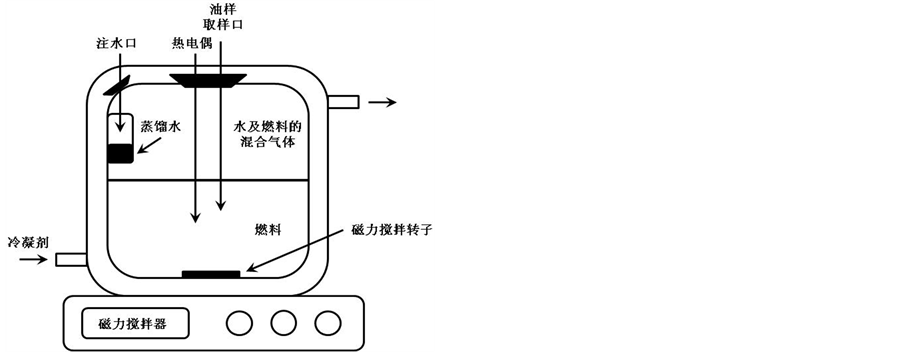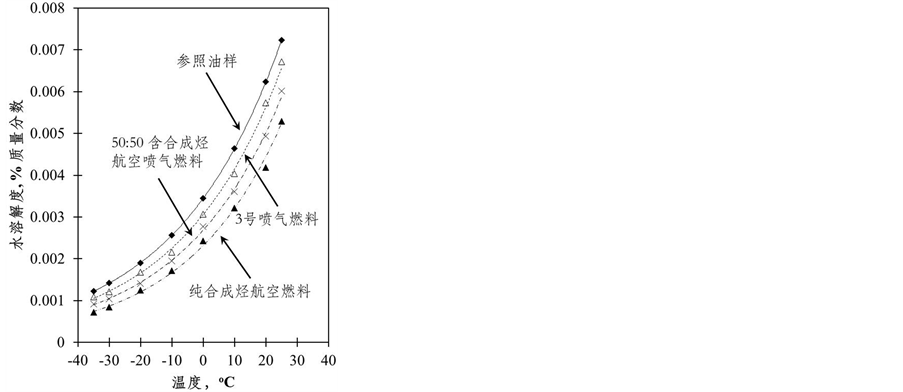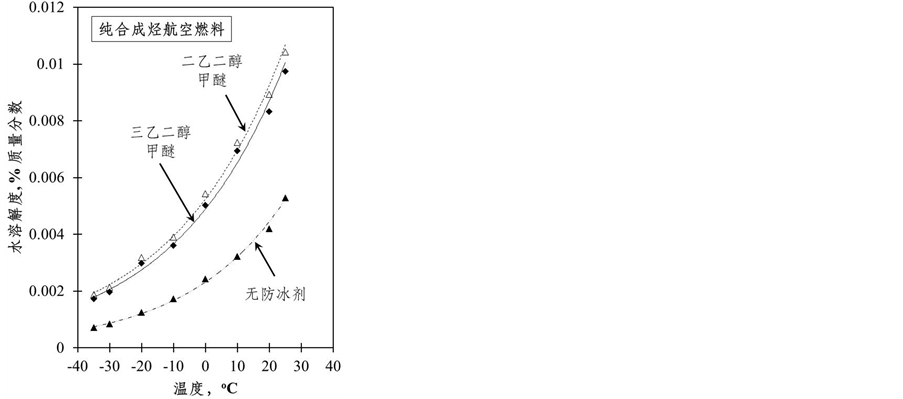1. 引言
航空喷气燃料在炼制、储存、运输及加注过程中受内部及外部因素影响将不可避免的混入少量水分。飞机在起飞过程中,外界温度的降低将导致水在喷气燃料中溶解度的降低,从而使喷气燃料中的溶解水转变成为自由水析出。万米高空的低温将使这些分散在油料中的自由水凝结成冰,如不能及时有效将其移除,这些冰粒将堆积成块引发油滤及输油管路的堵塞,最终造成燃油系统失效从而无法给发动机正常供油,引发飞行事故[1] [2] 。因此,测量水在不同温度下在喷气燃料中的溶解度对计算飞机在飞行过程中可能析出的自由水的量以及掌握飞行过程结冰量具有重要意义。
水在喷气燃料中的溶解度与燃料组成、燃料温度及燃料储罐上方水蒸气分压有关。当储罐上方气体完全被水蒸气所饱和,平衡状态下,溶解在喷气燃料中的水即为在该温度下水在喷气燃料中的最大溶解量。当喷气燃料上方气体的相对湿度小于100%时,燃料中水的溶解量将低于在饱和状态下的溶解量[3] 。为防止在低温下自由水在燃料中的结晶,在喷气燃料中加入防冰剂是增加水在相同温度下在喷气燃料中的溶解量的有效手段。燃油系统防冰剂多为醚类化合物,具有亲水及亲油双重性质,因与水形成氢键增大了燃料对水的溶解度,使燃料对水的溶解由可逆过程转变为不可逆过程[4] - [6] 。尽管目前已经积累了大量的关于水在不同温度下在传统3号喷气燃料中的溶解度数据[7] -[10] ,然而,燃油系统防冰剂的加入对水在喷气燃料中溶解度的影响尚未知晓,这就致使飞机设计制造者无法对防冰剂的加入对飞机飞行过程中自由水析出量的改变进行精确评估。研究燃油系统防冰剂对水在喷气燃料中溶解度的影响对优化飞机设计、增强飞行过程安全性具有重大意义。同时,含合成烃的航空喷气燃料等新型航空燃料的出现也使得有必要重新对水在不同燃料中的溶解度进行测试。本项目首先对水在低温条件下在不同喷气燃料中的溶解度进行了测试,然后深入研究了防冰剂种类、防冰剂加入浓度等对水在传统喷气燃料、含合成烃喷气燃料及纯合成烃燃料中溶解度的影响,项目的完成为燃油系统防冰剂在民航客机上的应用推广提供了基础性数据。
2. 实验部分
2.1. 油样准备
项目分别测量了水在不同温度下在3号喷气燃料、纯合成烃喷气燃料及50:50体积比的含合成烃喷气燃料中的溶解度。3号喷气燃料由中石化镇海炼厂提供,纯合成烃喷气燃料由中石化杭州炼厂提供,而50:50体积比的含合成烃喷气燃料由上述两种喷气燃料混合制备而成。其中,根据国标GB/T 11132-2008“液体石油产品烃类的测定–荧光指示剂吸附法”对上述3种喷气燃料测试结果显示3号喷气燃料芳烃体积含量为17.1%,烯烃体积含量为0.6%,50:50体积比的含合成烃喷气燃料芳烃体积含量为8.5%,烯烃体积含量为0.3%。根据美国材料测试协会标准ASTM D2425“质谱法测定中间馏分中烃类的试验方法”及D5291“仪器法测定石油产品及润滑油碳、氢、氮含量的试验方法”对纯合成烃喷气燃料的检测结果表明纯合成烃燃料中环烷烃、芳烃、链烷烃质量分数含量分别为2.8%,0及97.2%,碳氢含量质量分数为99.87%。三种油料的部分性质如表1所示。
2.2. 试验装置
燃料的冷却以及与水的平衡饱和在平衡槽中进行,其装置图如图1所示。该装置由一个外部玻璃容器和内部玻管组成,内部玻管上方用橡胶塞封闭。玻管内部管壁上方装有一个特别的盛水容器,以保证内管燃料上方气体被水蒸气所饱和。外部玻璃容器与内部玻管之间充满了冷凝剂乙醇,以保证试验进行过程中玻管内部油料温度与上方气体温度的均匀一致。实验进行前,将100 mL的油样预先装入内部玻管中,同时,将蒸馏水被置于内部玻管上方盛水容器中。其后,将玻管用橡皮塞密封,将其置于装有冷凝剂的外部烧杯中,开启磁力搅拌器,使油料在试管内得以充分搅拌。大约一小时后,燃料与上方水蒸气达到该温度下的平衡,利用针筒注射器抽取少量油样进行分析,即可得到在该温度下水在燃料中的溶解度。实验过程中,冷凝剂自下而上流动,并以10℃/h的冷凝速率对燃料进行冷却。燃料在充分搅拌的情况下,溶解水在温度降低的情况下将自动析出并挥发至玻璃试管上方,整个过程燃料始终保持清澈透明,无悬浮水析出。当达到指定冷凝温度后,燃料温度始终维持在0.1℃误差范围以内,同时利用针筒注射器

Table 1. Physical and chemical properties of different jet fuel
表1. 不同喷气燃料的物理化学性质
快速抽样进行分析。
2.3. 水在燃料中溶解度测试
实验对水在燃料中溶解度的测试完全依照美国材料测试协会标准ASTM D6304“卡尔菲休库伦法测定水在石油产品、润滑油及添加剂中含量的标准测试方法”进行。项目利用831 KF Coulometer (瑞士万通)库伦法卡尔菲休水分测定仪对 取样油样的溶解水进行测量。卡尔菲休试剂由梅特勒–托利多公司提供。滴定过程中,当伴随着电流突然增加的出现,则认为达到滴定终点。
3. 结果与讨论
3.1. 水在不同喷气燃料中的溶解度测量
项目首先考察了水在3号喷气燃料、纯合成烃喷气燃料及50:50体积比含合成烃航空喷气燃料中溶解度随温度变化的情况,如图2所示。其中,参照油样是指美国航空油料性质手册所提供的指定油样。

Figure 1. Setup for fuel solubility test
图1. 燃料溶解度测试装置图

Figure 2. Water solubility in different type of jet fuels
图2. 水在不同喷气燃料中的溶解度
油样中烷烃、芳烃及烯烃的体积含量分别为74.6%,23.9%,1.5%。由实验结果可知,无论油样组成如何,随温度的降低,水在燃料中的溶解度呈指数形式下降。以3号喷气燃料为例,20℃时,水在其中的溶解度质量分数为0.00573%,当温度为−20℃时,水在其中的溶解度质量分数仅为0.00168%。相同温度下,水在参照油样中的溶解度最高,3号喷气燃料次之,在纯合成烃航空燃料中溶解度最低。这与油料的组成有关。有研究表明,在碳7至碳12范围内,水在直链烷烃中的溶解晗及溶解度与碳数无关,为34.9 ± 1.1 kJ/mol,在芳烃和烯烃中的溶解晗比在相同碳数的直链烷烃中的溶解晗分别低11 kJ/mol和2 kJ/mol。25℃条件下,水在碳5到碳9烷烃中的溶解度为70 ppm到100 ppm质量分数,而在芳烃中溶解度为430 ppm到690 ppm质量分数[1] 。这主要是因为芳烃化合物因具有特殊的六元环,使得π电子云得以均匀分布。而水分子因氢氧原子的电负差而具有很强的偶极性。同烷烃及环烷烃化合物相比,水分子与芳烃化合物相互间形成的静电吸引力增强了水在芳烃中的溶解度。比较上述四种油样,其中,参照油料的芳烃体积分数最高23.9%,3号喷气燃料次之17.1%,50:50体积比含合成烃航空喷气燃料再次之8.5%,而纯合成烃喷气燃料中则无芳烃,这也就造成了在相同温度下水在4种油样中溶解度呈逐步减小的趋势。
3.2. 防冰剂对水在喷气燃料中溶解度影响
在燃料中加入燃油系统防冰剂能有效增加水在燃料中的溶解度,使燃料对水的溶解由可逆过程变为不可逆过程,防止水分析出。图3、图4分别比较了加入防冰剂前后水在3号喷气燃料、纯合成烃中溶解度随温度的变化。实验选取的燃油系统防冰剂为二乙二醇单甲醚及三乙二醇单甲醚。二乙二醇单甲醚为现在各国适航当局批准使用的飞机燃油系统防冰剂,尽管其在军用飞机上成功使用二十余年,但近年来发现的飞机油箱内部涂层脱落、油箱金属材料腐蚀均证实与二乙二醇单甲醚相关,因此,二乙二醇单甲醚大有被三二乙二醇单甲醚取代的趋势。项目的对比研究将为三二乙二醇甲醚的应用提供有用的参考数据。由图3及图4的比较可知,无论油品组成如何,加入燃油系统防冰剂不同程度的增加了燃料对水的溶解度。−20℃条件下,无防冰剂时,水在3号喷气燃料及纯合成烃喷气燃料中的溶解度质量分数分别为0.00168%,0.00125%,燃油中加入0.2%体积分数的二乙二醇甲醚或三乙二醇甲醚后,水在3号喷气燃料及纯合成烃喷气燃料中的溶解度质量分数分别增加为0.00443%,0.00418%,0.00318%,0.00298%。尽管水在含二乙二醇单甲醚的燃料中的溶解度略高于其在含三乙二醇单甲醚燃料中的溶解度,但同水在

Figure 3. Impact of icing inhibitor on water solubility in jet fuel
图3. 防冰剂对水在喷气燃料中溶解度影响
未加入燃油系统防冰剂燃料中的溶解度相比,三乙二醇加醚的加入有效抑制了水在低温条件下从燃料中的析出。加入燃油系统防冰剂能有效增加水在燃料中的溶解度主要是因为防冰剂多为醚醇类化合物,化合物的羟基具有良好的亲水性,能与燃料中微量水缔合形成氢键,而防冰剂的烃基具有亲油性,从而增大了水在燃料中的溶解度。
3.3. 防冰剂浓度与水在喷气燃料中溶解度关系
图5展示了防冰剂浓度对水在不同温度下对其3号喷气燃料中溶解度的影响。由图可知,随浓度的增加,相同温度下水在燃料中的溶解度迅速增加。在−20℃,水在不含三乙二醇甲醚及含0.10%,0.15%及0.20%体积浓度的三二乙二醇甲醚喷气燃料中的溶解度质量分数分别为0.00168%,0.00322%,0.00343%,

Figure 4. Impact of icing inhibitor on water solubility in synthesized hydrocarbon
图4. 防冰剂对水在纯合成烃中溶解度影响

Figure 5. Impact of icing inhibitor concentration on water solubility in jet fuel
图5. 防冰剂浓度对水在喷气燃料中溶解度影响
0.00418%。然而,成倍增加防冰剂的浓度并未能导致水在燃料中溶解度的成倍增加。水在燃料中含三乙二醇单甲醚体积浓度为0.20%时的溶解度仅为在燃料中含三乙二醇单甲醚体积浓度为0.10%时的1.298倍。这也说明加大防冰剂浓度仅能有限的增加水在其中的溶解度。
为精确计算温度降低时水从3号喷气燃料中的析出量,项目建立了水的溶解度与温度的函数关系。项目假定水蒸气为理想气体,3号喷气燃料为理想溶液,则水在燃料中的溶解度与温度应满足下述关系:
 (1)
(1)
其中,c为溶解度,Hs为溶解晗。对上述方程积分即可得:
 (2)
(2)
其中 ,
, 。
。 ,
, 分别为溶解熵及溶解晗,R为气体常数。
分别为溶解熵及溶解晗,R为气体常数。
图6为水在无防冰剂及含0.20%体积浓度三乙二醇甲醚及0.2%体积浓度二乙二醇甲醚喷气燃料中溶解度对数与温度倒数线性关系图。实验结果与计算结果得以很好的拟合。值得提出是在0℃时,线性回归曲线有明确的拐点出现。在0℃出现的线性回归曲线斜率的变化主要是因为在水-冰相变化时出现的油水系统的晗和熵的不连续变化。
4. 结论
项目首先对水在3号喷气燃料、纯合成烃喷气燃料及50:50体积比含合成烃喷气燃料中的溶解度进行了测量,结果表明,随温度的降低水在三种不同燃料中的溶解度呈指数形式下降,随燃料中芳烃含量的增加,水在燃料中的溶解度逐步增大。这主要是因为极性水分子与芳烃化合物之间的静电作用力有关。在三种燃料中加入防冰剂均能有效提高水在相同温度下在燃料中的溶解度,避免了低温下自由水的析出,且三乙二醇单甲醚与二乙二醇单甲醚具有相近的增强水分子在燃料中溶解度的性能。醇醚类化合物的亲

Figure 6. Linear regression curve for water solubility in jet fuel containing icing inhibitor
图6. 水在含防冰剂喷气燃料中溶解度线性回归曲线
水亲油双重性质促进了水在燃料中的溶解度。增加防冰剂浓度能有效增大水在燃料中的溶解度,但成倍增加防冰剂的浓度并未能导致水在燃料中溶解度的成倍增加。此外,水在燃料中的溶解度的对数与温度的倒数呈线性关系,且在0℃出现斜率的突变,这主要是因为该温度下出现的冰水相转化导致的溶解晗和溶解熵的不连续变化所致。
基金项目
国家自然基金项目“新型环境友好飞机燃油系统防冰剂的研究”(U1433101)。